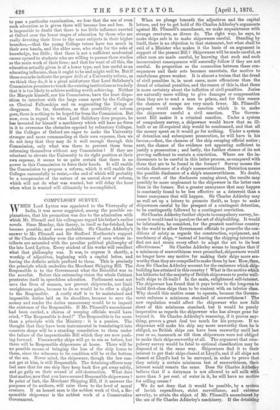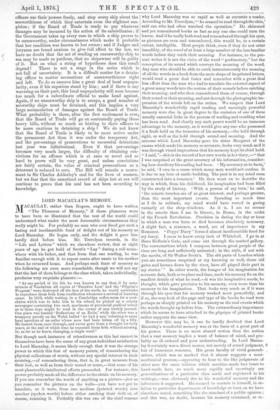COMPULSORY SURVEY.
WHEN Lord Lytton was- appointed to the Viceroyalty of India, it was never suggested, among the possible ex- planations, that his promotion was due to the admiration with whioh. Mr. Disraeli and his colleagues regard his father's earlier novels. Since Monday, this theory, in itself so far-fetched, has become possible, and even probable. Sir Charles Adderley's answer to Mr. Plimsoll and Sir Stafford Northcote's support of Sir Charles Adderley were the utterances of men whose in- tellects are saturated with the peculiar political philosophy of the late Lord Lytton. Every student of his works will recollect what that philosophy was. It was, to express it shortly, a worship of adjectives, beginning with a capital letter, and having the definite article prefixed to them. This is precisely the principle which underlies the Merchant Shipping Bill. The Responsible is to the Government what the Beautiful was to the novelist. Before this entrancing vision the whole Cabinet prostrates itself in speechless adoration. Parliament must not save the lives of seamen, nor prevent shipwrecks, nor limit unrighteous gains, because to do so would be to offer a slight to the Responsible. A costly staff is to be maintained and impossible duties laid on its shoulders, because to save the money and render the duties unnecessary would be to imperil the existence of the Responsible. If Mr. Plimsoll's amendment had been carried, a chorus of weeping officials would have cried, "The Responsible is dead l" The Responsible is far more than a principle with the Ministry : it is a passion. The thought that they have been instrumental in translating it into concrete shape will be a standing consolation to them under the failure of the impracticable Bill which they are now push- ing forward. Unseaworthy ships will go to sea as before but there will be Responsible shipowners at home. There will be no possible means of bringing the loss of the ship home to them, since the witnesses to its condition will be at the bottom of the sea. Never mind, the shipowner, though the law can- not get at him is still Responsible. The detaining officers may feel sure that for one ship they keep back five get away safely, and go gaily on their errand of self-destruction. What does that matter, now that you have secured Responsible shipowners? In point of fact, the Merchant Shipping Bill, if it answers the purposes of its authors, will raise them to the level of moral creators. If an honest man is the noblest work of God, a Re- sponsible shipowner is the noblest work of a Conservative Government. When we plunge beneath the adjectives and the capital letters, and try to get hold of Sir Charles Adderley's arguments against Mr. Plimsoll's amendment, we make acquaintance with strange creatures, as divers do. The right way, he says, to make ships safe is to make shipowners careful. Standing by itself, there is no objection to that statement, but what shall be said of a Minister who makes it the basis of an argument in support of the present Bill? Shipowners will be made careful, as other men are made careful, by knowing that such and such inconvenient consequences will assuredly follow if they are not careful. In proportion as the connection between these con- sequences and their acts becomes uncertain, the motive to carefulness grows weaker. It is almost a truism that the dread of civil penalties is, in most cases, more efficacious than the dread of criminal penalties, and the reason of this is, that there is more certainty about the infliction of civil penalties. Juries are naturally more willing to give damages or compensation than they are to send a man to prison, and for this reason the chances of escape are very much fewer. Mr. Plimsoll's proposal would make the sanction which is to make the shipowner careful a civil sanction. The Govern- ment Bill makes it a criminal sanction. Under a system of compulsory survey, a shipowner would know that an in- built or an ill-repaired ship would be condemned, and that all the money spent on it would go for nothing. Under a system of detention and subsequent prosecution, he will have in his favour,—first, the chances of the ship escaping official notice; next, the chance of the evidence not appearing sufficient to justify a prosecution ; and lastly, the further chance of its not proving sufficient to sustain a conviction. Where are the in- ducements to be careful in this latter process, as compared with those that are to be found in the former ? Survey means the certain disclosure of a ship's unseaworthiness. Detention means the possible disclosure of a ship's unseaworthin' ess. No doubt, in the event of the disclosure coming about, the results may possibly be more unpleasant to the shipowner in the latter case than in the former. But a greater annoyance that may happen is constantly found to be less effective as a deterrent than a lesser annoyance that will happen. Sir Charles Adderley may as well set up a lottery to promote thrift, as hope to make shipowners careful by the prospect of a contingent detention, to be contingently followed by a contingent conviction.
Sir Charles Adderley further objects to compulsory survey, be- cause it would tend to paralyse the art of shipbuilding. It would be infatuation, he considers, for the greatest maritime country in the world to allow Government officials to prescribe the con- ditions of safety as regards the construction, equipment, and machinery of ships, "instead of leaving the shipping interest to find out and strain every effort to adapt the art to its best effectiveness." Sir Charles Adderley seems to imagine that if a minimum of seaworthiness were prescribed, shipowners would no longer have any motive for making their ships more sea- worthy than they are compelled to make them bylaw. How,then, does Sir Charles Adderley account for the eminence which ship- building has attained in this country What is the motive which has hitherto led the majority of British shipowners to prefer well- built ships to ill-built? In the main, enlightened self-interest. The shipowner has found that it pays better in the long-run to build first-class ships than to be content with an inferior class. Why should this motive cease to operate, because the Govern- ment enforces a minimum standard of seaworthiness ? The new regulation would affect the shipowner who now falls short of this minimum standard, but it would be purely inoperative as regards the shipowner who has always gone far beyond it. Sir Charles Adderley's reasoning, if it proves any- thing, proves a great deal too much for his purpose. If no shipowner will make his ship any more seaworthy than he is obliged, no British ships can have been seaworthy until last year or so, inasmuch as till then shipowners were not obliged to make their ships seaworthy at all. The argument that com- pulsory survey would be fatal to optional classification may be disposed of in the same way. Shipowners find it to their interest to get their ships classed at Lloyd's, and if all ships not classed at Lloyd's had to be surveyed, in order to prove that they satisfy a certain minimum test of seaworthiness, their interest would remain the same. Does Sir Charles Adderley believe that if a dairyman is not allowed to sell milk with more than 5 per cent, of water in it, he will have no motive for selling cream?
We do not deny that it would be possible, by a system of lavish expenditure, strict surveillance, and extreme severity, to attain the object of Mr. Plimsoll's amendment by the use of Sir Charles Adderley's machinery. If the detaining officers use their powers freely, and stop every ship about the seaworthiness of which they entertain even the slightest sus- picion; if the Board of Trade is ready to pay whatever damages may be incurred by the action of its subordinates ; if the Government takes up every case in which a ship proves to be unseaworthy, under circumstances which make it probable that her condition was known to her owner; and if Judges and jurymen are found anxious to give full effect to the law, we have no doubt that the act of sending an unseaworthy ship to sea may be made so perilous, that no shipowner will be guilty of it. But on what a string of hypotheses does this result depend 1 There is not a stage in the series which is not full of uncertainty. It is a difficult matter for a detain- ing officer to scatter accusations of unseawortb.iness right and left. To do so ensures him a great deal of local unpopu- larity, even if his superiors stand by him; • and if there is any wavering on their part, this local unpopularity will soon become too much for a subordinate official to make head against. Again, if no unseaworthy ship is to escape, a good number of seaworthy ships must be detained, and this implies a very large accumulation of damages against the Board of Trade. What probability is there, after the first excitement is over, that the Board of Trade will go on contentedly paying these heavy bills, without so much as hinting to their officers to be more cautious in detaining a ship ? We do not know that the Board of Trade is likely to be more active under the permanent Act than it was under the temporary Act, and the per-centage of prosecutions to successful detentions last year was infinitesimal. Even if that per-centage becomes very much larger, the difficulty of obtaining con- victions for an offence which is at once so novel and so hard to prove will be very great, and unless convictions are fairly certain, the value of criminal prosecutions as a deterrent is reduced to zero. The Bill will remain a monu- ment to Sir Charles Adderley's zeal for the lives of seamen, but we fear that the unnoticed record of ships lost at sea will continue to prove that his zeal has not been according to knowledge.



































 Previous page
Previous page